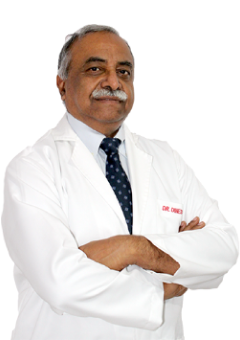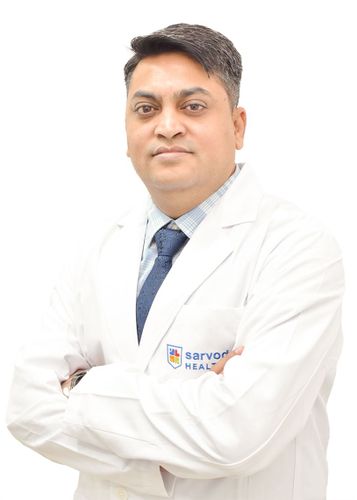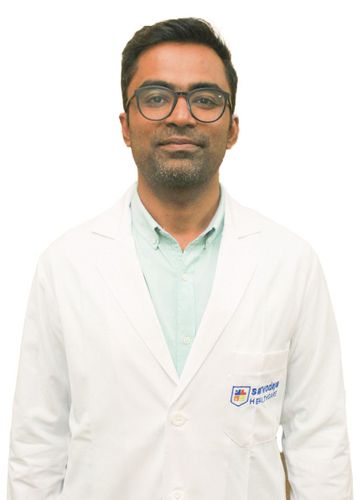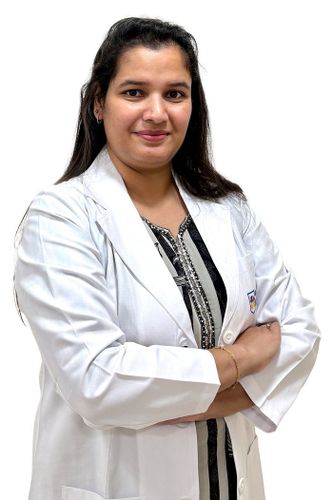Overview
At Sarvodaya Hospital, we provide comprehensive and compassionate care for women diagnosed with ovarian cancer. Ovarian cancer happens when abnormal cells in the ovaries begin to grow uncontrollably, sometimes spreading to nearby organs.
Early symptoms can be subtle, which is why timely screening and expert support are crucial. As the best ovarian cancer hospital in India, we combine advanced diagnostics, expert specialists, and a personalised treatment approach to ensure you receive the best possible care for your health and peace of mind. Our team includes leading ovarian cancer specialist doctors in Faridabad, dedicated to guiding you through every step of your recovery.
Symptoms of Ovarian Cancer
- Persistent abdominal bloating or swelling
- Pain or discomfort in the abdomen or pelvis
- Feeling full quickly when eating or loss of appetite
- Unexplained weight loss
- Increased frequency or urgency of urination
- Fatigue or feeling tired all the time
- Back pain
- Changes in bowel habits
- Indigestion or nausea
- Unusual vaginal bleeding, especially after menopause
- Pain during sexual intercourse
- Menstrual changes or irregularities
Causes of Ovarian Cancer
- Family history of ovarian, breast, or colorectal cancer
- Inherited genetic mutations
- Increasing age
- Personal history of breast or bowel cancer
- Early onset of menstruation (before age 12)
- Late menopause
- Never having been pregnant or having a first child after age 35
- Use of hormone replacement therapy (HRT) after menopause
- Use of fertility treatments
- Endometriosis
- Obesity or being overweight
- Smoking
- Diabetes
- Radiotherapy for previous cancers
- Ashkenazi Jewish descent
Diagnosis of Ovarian Cancer
Diagnosing ovarian cancer involves several steps, each designed to provide a clear and accurate understanding of your health. At Sarvodaya Hospital, our team ensures every diagnosis is thorough and patient-centred for your complete peace of mind.
Our experienced ovarian cancer doctors in Faridabad use advanced tools and compassionate care to guide you from diagnosis to recovery.
- Medical History & Pelvic Examination: The process begins with a detailed review of your symptoms and family history. A pelvic examination is performed to check for lumps or swelling in the ovaries and neighbouring areas.
- Imaging Tests: Transvaginal Ultrasound (TVUS): Often the first imaging test, TVUS distinguishes solid tumours from fluid-filled cysts and helps assess the ovaries' structure and size.
- Blood Tests and Tumour Markers: The CA-125 blood test measures a protein that can be elevated in some ovarian cancers. Other tumour markers may also be checked, but elevated levels can occur with non-cancerous conditions too, so these tests are not used alone for diagnosis.
- Biopsy (Tissue Sampling): A definitive diagnosis requires a tissue sample, typically obtained during an operation such as laparoscopy or laparotomy, though sometimes a needle biopsy is used. Examination under a microscope by a pathologist confirms the presence of cancer cells and identifies the specific type of ovarian cancer.
- Genetic Testing: For many women, especially those with a family history, testing for genetic mutations like BRCA1 and BRCA2 is important. This helps guide treatment choices and supports family risk counselling. At Sarvodaya, our ovarian cancer doctors in Delhi NCR ensure every step of your diagnosis is handled with expertise and compassion.
Treatment of Ovarian Cancer
- Surgery: Surgery is often the first line of defence. Depending on your needs and stage of cancer, this may involve removing one or both ovaries, the uterus, fallopian tubes, omentum, and at times, nearby lymph nodes. For advanced ovarian cancer, our team is experienced in aggressive cytoreductive (debulking) surgery, aiming to eliminate as much visible tumour as possible to enhance treatment outcomes. We offer advanced ovarian tumor treatment in Faridabad tailored to your condition.
- Chemotherapy: Most women receive chemotherapy after surgery (adjuvant), using platinum- and taxane-based medicines like carboplatin and paclitaxel. Sometimes, chemotherapy is given before surgery (neoadjuvant) to shrink tumours. In selected cases, intraperitoneal chemotherapy delivers these drugs directly into the abdominal cavity, boosting their local effect.
- Hormonal Therapy: Used mainly for select low-grade or hormone-sensitive ovarian cancers, these medicines help slow disease progression.
- Immunotherapy and Research Technologies: While not yet standard, emerging techniques such as phage display and deep visual proteomics are under research, bringing hope for increasingly targeted and effective future treatments.
Prevention & Lifestyle Modification for Ovarian Cancer
At Sarvodaya Hospital, we believe informed choices and healthy habits play a crucial role in reducing your risk of ovarian cancer. Our focus on prevention complements our commitment as the best ovarian cancer hospital in India, offering not just treatment, but guidance for lifelong well-being. You’ll be supported by an experienced ovarian cancer specialist in Delhi NCR who tailors care to your unique needs.
- Consider genetic counselling and testing if you have a family history of ovarian, breast, or colorectal cancer.
- Risk-reducing surgery may be advised for high-risk women after completing their families.
- Maintain a healthy weight with regular exercise and a balanced diet rich in fruits and vegetables.
- Oral contraceptive pills may reduce the risk, but should be discussed with your doctor.
- Use hormone replacement therapy (HRT) only under strict medical guidance and for the shortest duration.
- Stay aware of symptoms like bloating, pelvic pain, or urinary changes and seek timely care.
- Schedule routine gynaecological check-ups, especially if you have a family history of cancer.
Pre–Post Ovarian Cancer Surgery Lifestyle Modifications
Pre-Treatment Modifications- Get a full medical checkup to manage infections and chronic conditions.
- Work with a dietitian to eat balanced, nutrient-rich meals.
- Do light exercises like walking or stretching to build physical strength.
- Quit smoking and limit alcohol to reduce risks and aid recovery.
- Seek counselling support to manage stress and anxiety.
- Share all medications and supplements with your care team.
- Clean and care for surgical wounds as advised to avoid infections.
- Start with soft foods, then slowly return to a regular diet.
- Resume physical activity gradually, beginning with light tasks.
- Try pelvic therapy to manage discomfort and strengthen muscles.
- Track symptoms like fatigue or bladder changes and inform your doctor.
- Stay emotionally supported through counselling or survivor groups.
- Maintain hygiene, stay vaccinated, and report unusual symptoms promptly.
- Keep follow-up appointments for lab tests and scans.









